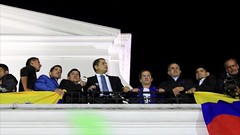
President Rafael Correa of Ecuador has prevailed over an attempted right-wing coup that was led by the police. The military leaders sided with the leftist government routing the coupmakers on October 1, 2010.
Originally uploaded by Pan-African News Wire File Photos
Report confirmed: U.S. intelligence penetrated the heart of the Ecuadorian police force
Jean-Guy Allard
THE uprising against President Rafael Correa by a coup faction within the Ecuadorian police force is confirmed in an alarming report into the infiltration of this force by U.S. intelligence services published in 2008, which states how many members of the police departments were developing a "dependency" on the U.S. embassy in that South American country.
The report specifies that certain police units "have an informal economic dependence on the United States in terms of paying informants, training, equipment and operations."
The systematic use of corruption techniques on the part of the CIA in order to secure the "good will" of police officers was exposed on many occasions by former CIA agent Philip Agee who, prior to leaving the agency, was assigned to the U.S. embassy in Quito.
In his official report, published at the end of 2008, Ecuadorian Defense Minister Javier Ponce revealed how U.S. diplomats dedicated themselves to corrupting police officers and also officers within the Armed Forces.
Confirming that fact, the leadership of the Ecuadorian police force then announced it intended to sanction its agents who were collaborating with Washington, while the U.S. embassy declared the "transparency" of its support for Ecuador.
"We are working with the Ecuadorian government, the military and the police, for very important security purposes," declared Heather Hodges, the U.S. ambassador in Quito.
However, the diplomat told journalists that she would make no comment "on intelligence issues."
For her part, press attaché Marta Youth categorically refused to discuss the Ecuadorian government’s condemnations, which include the CIA’s participation in an operation with Colombia which resulted in the Colombian military attack against FARC guerrillas on Ecuadorian territory on March 1 of that year.
Army intelligence chief Mario Pazmiño was removed from his post for concealing information related to the attack on the FARC.
In the past few months, U.S. officials have appeared in Ecuador on the pretext of strengthening relations between Ecuador and the United States.
Arturo Valenzuela, assistant secretary of state for Western hemisphere affairs, traveled to Ecuador and met with President Correa with a view to securing a visit by Secretary of State Hillary Clinton to that country.
Valenzuela was accompanied by Todd Stern, "special envoy for climate change", is also known for his affinity to the CIA."
No comments:
Post a Comment